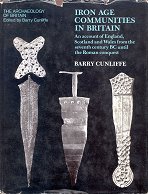
It is not often that a new idea enters the world of ancient and medieval history, but in Facing the Ocean Barry Cunliffe presents a fresh approach that will change our view of the European past. After many years of research and fieldwork, he has come to believe that the peoples of Iceland, Scotland, Ireland, Brittany, Spain, Portugal, and Gibraltar all share an identity shaped by thousands of years of living along the Atlantic shore.
Facing the Ocean shows that Celts, Bretons, and Galicians had a closer kinship with seafaring neighbours than with their English, French, and Spanish countrymen. Indeed the very act of living on the edge of the world created a collective consciousness that was, and is still today, specifically ‘Atlantic’—an identity that has produced cultures of great inventiveness and works of art of beauty and originality.
Exploring almost 10,000 years of human life—from the mesolithic hunter-gatherers who first exploited fish and fruits to fifteenth-century explorers who found lands beyond the horizon—Facing the Ocean at last accords the Atlantic its rightful place in European history.
Beautiful illustrations bring the evidence to life—from photographs of the hard rocks and promontories of the Atlantic coast to stunning art that retells enthralling legends of lost continents and ocean monsters.
The contributors show how our understanding of the past has changed, reveal the exciting ideas under current debate, and offer their visions of the future.
The result is a remarkable overview of world archaeology, focusing on new and unexpected themes at the cutting edge of the discipline.
In this magnificent book, distinguished archaeologist Barry Cunliffe views Europe not in terms of states and shifting political land boundaries but as a geographical niche particularly favored in facing many seas. These seas, and Europe’s great transpeninsular rivers, ensured a rich diversity of natural resources while also encouraging the dynamic interaction of peoples across networks of communication and exchange. The development of these early Europeans is rooted in complex interplays, shifting balances, and geographic and demographic fluidity.
Weaving together titanic concepts while remaining sensitive to specifics, Cunliffe has produced an interdisciplinary tour de force. His is a bold book of exceptional scholarship, erudite and engaging, and it heralds an entirely new understanding of Old Europe.
To answer this question, Bretons and Britons explores the long history of the Bretons, from the time of the first farmers around 5400 BC to the present, and the very close relationship they have had with their British neighbours throughout this period. More than simply a history of a people, Bretons and Britons is also the author’s homage to a country and a people he has come to admire over decades of engagement.
Throughout, the story is punctuated by the Bretons’ fierce struggle to maintain their distinctive identity. As a peninsula people living on a westerly excrescence of Europe they were surrounded on three sides by the sea, which gave them some protection from outside interference, but their landward boarder was constantly threatened—not only by succeeding waves of Romans, Franks, and Vikings, but also by the growing power of the French state.
It was the sea that gave the Bretons strength and helped them in their struggle for independence. They shared in the culture of Atlantic-facing Europe, and from the eighteenth century, when a fascination for the Celts was beginning to sweep Europe, they were able to present themselves as the direct successors of the ancient Celts along with the Cornish, Welsh, Scots, and Irish. This gave them a new strength and a new pride, the spirit of which still very much alive today.